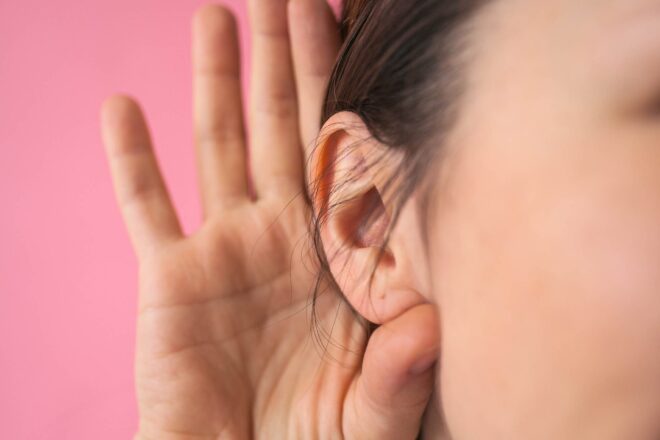If you are searching for information on hearing aids, it is probably because you have noticed a change in your hearing, or you are concerned about a loved one’s hearing. Maybe you’ve considered trying hearing aids over the past few months, but you don’t know how to choose the right one. If you notice a change in your own hearing or the hearing of a loved one, it is important to determine your hearing status by visiting a hearing health provider. To determine if your hearing loss is significant enough to need treatment, a full hearing evaluation is required.
Some hearing loss is due to something as simple as wax in your ear. Other times there may be an obstruction. In that case, hearing aids may not be the best solution. A hearing care provider can advise you if you need hearing aids. They are specially trained in hearing aid technology. Picking out the proper device depends on how severe your hearing loss is, your needs and lifestyle.
How Do I Know If I Need Hearing Aids?
The first step is to schedule an appointment with a hearing care provider who focuses on determining hearing loss and who programs and fits devices. There are essentially 3 categories of providers: an audiologist, hearing instrument specialist, and Otolaryngologist (ENT).
An audiologist is a licensed hearing health professional with a higher degree (a masters or doctorate in audiology) that specializes in . You may also encounter a hearing instrument specialist, who is trained (up to 2 years of specialized training) specifically in audiometric testing and hearing aid fitting/programming. There are also physicians who specialize in the ear called Otolaryngologists (ENTs). If hearing loss is from a serious health concern, an audiologist or hearing instrument specialist may refer you to an ear, nose, and throat specialist.
Whether you see an audiologist or HIS, during your visit to our office, our professionals will perform a series of hearing tests which will assess the severity of your hearing loss or the cause.
Signs of Hearing Loss
These are some signs you should look out for if you think you may be experiencing hearing loss:
- Muffled sounds or speech
- Difficulty understanding words or background noises
- Frequently asking others to speak slowly
- Withdrawing from conversation
- Needing to turn up the television or radio
- Tinnitus (ringing, buzzing, humming, roaring in the ears)
What are the Age Ranges of Someone with a Hearing Loss?
Hearing loss can happen at any time during a person’s life. Often, it is age-related and will gradually get worse over time. It can also go unnoticed since the progression is so gradual. This is the most common cause of hearing loss, and why seniors are especially prone to hearing loss.
Younger adults who experience hearing loss are most likely experiencing damage from loud noises that could be triggered by extended use of headphones or earbuds, or frequenting loud environments like manufacturing plants, bars, or concerts. There are cases where children are born with hearing loss or deafness.
Causes of Hearing Loss
There are multiple factors that can cause hearing loss. As mentioned above, aging is a common cause of hearing loss. There is also noise induced hearing loss. Exposure to loud noises can cause damage to your nerve cells that are placed in the cochlea that also sends signals to the brain. If you work in an exceptionally noisy environment (i.e. working in a factory or around machinery) or have noisy hobbies (i.e. shooting or concerts) you may have diminished hearing.
An increasing buildup of earwax could also be a culprit. Earwax could be clogging the ear canal, preventing the conduction of sound waves. Getting a simple earwax removal could restore your hearing.
A ruptured eardrum could also induce hearing loss. A loud blast of noise, sudden change in pressure, or even poking your eardrum with an object or infection can cause your eardrum to rupture and disrupt your hearing. A ruptured eardrum can often be repaired with a procedure called a tympanoplasty, which would be performed by a medical doctor.
How Do Hearing Aids Work?
Hearing aids are a small yet complex device that are designed to be programmed to the prescription of your hearing loss as well as fitting your lifestyle. Today’s hearing aids are equipped with a computer chip that analyzes the varying listening environments that you’ll be in as well as the programming that your hearing care provider expertly encrypted to your audiogram.
Hearing loss suppresses your ability to hear and make out specific sounds or syllables. The main purpose of using a hearing aid is to improve hearing and speech comprehension in varying environments. An untreated hearing loss can be connected to numerous declines in quality of life, such as social isolation, cognitive decline, and limited employment opportunities.
Hearing Aid Styles
Should a hearing care provider say that you need hearing aids, there are two main styles with a variety of features to choose from. Your hearing care provider will determine the most appropriate hearing aid for you based on your hearing loss as well as taking into consideration your requests and lifestyle.
The two main styles of hearing aids are:
- Behind-the-ear (BTE) aids are the most common hearing aid style due to their discreteness and versatility in fitting most hearing losses. The main portion of the hearing aid that houses the computer chip are placed behind the ear with a small receiver wire that is placed down into the ear canal.
- In-the-ear (ITE) hearing aids are the style where the entire hearing aid fits down into the ear canal. All hearing aid components are housed in the aid. Your hearing care provider will typically take an impression of your outer ear and ear canal. The impression is then sent to the hearing aid manufacture where it will be custom made to fit your ear(s).
The best way to choose which style is right for you is to have a discussion with your hearing care provider. The solution that you both decide on will be determined based on your hearing loss, possible dexterity concerns, as well as your preference in style.
How To Prevent Hearing Loss
We’re not always in full control of the sounds in our environment; however, you can start making conscious decisions to help prevent hearing loss. To prevent noise-induced hearing loss, the optimal solution would be to avoid extremely noisy environments. However, that’s not always possible. Purchasing earplugs, protective earmuffs, or noise-canceling headphones in a loud environment is the most ideal solution. Also, keeping the volume of your music at a moderate level will help decrease the changes of noise induced hearing loss.
It is vital, at any age, to make an appointment with a hearing care provider to see if you have any current issues with your ears, or you can take our Online Hearing Test.
Take Control of Your Hearing Health
To get your hearing tested, schedule an appointment with an American Hearing Centers Hearing Care clinic. Our experienced audiologists and other providers are ready to support your journey to improved hearing and a higher quality of life.



